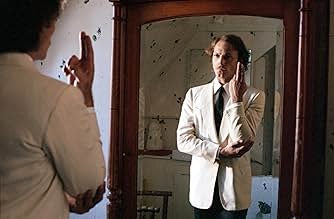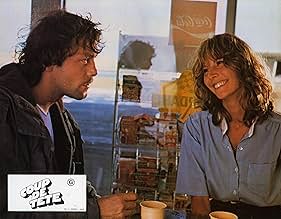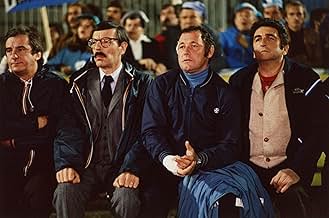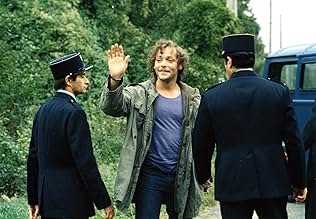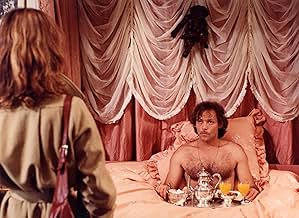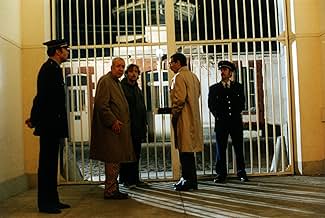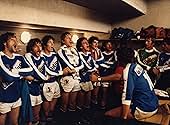Coup de tête
- 1979
- 1 घं 29 मि
IMDb रेटिंग
7.2/10
2.3 हज़ार
आपकी रेटिंग
अपनी भाषा में प्लॉट जोड़ेंThe miserable football player becomes a town hero after bringing victory in extremely important game. He uses his fame for revenge to the team star for the previous mockeries.The miserable football player becomes a town hero after bringing victory in extremely important game. He uses his fame for revenge to the team star for the previous mockeries.The miserable football player becomes a town hero after bringing victory in extremely important game. He uses his fame for revenge to the team star for the previous mockeries.
- पुरस्कार
- 1 जीत और कुल 1 नामांकन
कहानी
क्या आपको पता है
- इसके अलावा अन्य वर्जनIn Spain the movie was dubbed twice. First on its theatrical release in 1982, and again in 2013 when it was release for the first time on DVD. The 1982 dubbing can only be found on the 80s VHS.
- कनेक्शनFeatured in Francis Veber artisan du rire: La mécanique dure rire (2002)
फीचर्ड रिव्यू
NOTE: This review should be read in conjunction with the one I have written for "À mort l'arbitre!" (1984).
The French cinema has not dealt much with football, and stories about it. Few films have been made about it, and are more on the sociological than the athletic. "Coup de tête" is one of them.
Written by famed director Francis Veber ("La chèvre", "Les fugitifs", "Le dîner des cons"), the film follows a young football player and factory worker named François Perrin (Patrick Dewaere), whose greatest fault is his irritability. Due to this element of his character, he gets thrown out of the team and the factory - coincidentally, they have the same president - and gets falsely accused for rape. Luck shines for him when he is chosen to play for his old football team that is lacking players during the French cup. Through his contribution, they win the game, and Perrin sets out to revenge his old rivals that put him in prison.
In the film, football serves more as an occasion to demonstrate the behaviour of the local authorities to the young players. Perrin is at first regarded as nothing more than a scum of the society, but this changes as soon as he wins. He is given countless gifts and perks, but he, like a modern Count of Monte Christo, only has revenge in his mind. The authorities, factory owners, industrialists, even garage owners, are the heads of small-town, close societies where every faux pas is deplorable and everyone thinks for themselves. The presidents of the team also belong in this society and only regard the players as means of profiting than as real athletes. Bribery, hypocrisy, everything is used to force the young star into submission. For, if he really engaged in revenge, he would do it by ridiculing these prominent members of the society, something that would damage their status irreparably.
It is, thus, an oxymoron that a film whose heroes are so stuck in the past has such a modern-sounding - for the standards of the time - score. Composed by famous singer Pierre Bachelet, it mostly consists of one instrumental, repeated during the feature. Its guitar-driven sound seems very suited to the era - it sounded like a milder version of a Bay City Rollers piece - and its playing during Perrin's confrontation with the authorities serves as a perfect contradiction between the old France, the heroes of the film, and the new France, the people who made it.
The joy of the sport, so often emphasized by real-life players and fans, is almost nonexistent. The players are subjected to constant pressure in order to win the Cup and so every sense of satisfaction that may have existed quickly disappears. The chants they sing before every game also serve the aim of winning, motivating the players to perform well.
In stories of real football stars, frequent is the classic "from zero to hero" story, in which a player from a poor background becomes famous due to their exceptional talent. Perrin, portrayed excellently by Dewaere, is also one of these zeroes to heroes. Only his talent saves him from prison, and gives him the authority to punish his enemies without facing the consequences. The fact that we don't see what happens afterwards shows the hero's real intentions even more. It is evident that he will continue enjoying fame and its trappings, but this is of no interest for the film. The real aim of the film was to satirise the old authorities of the French rural society for which the sport was no more special than investing in a store.
All in all, despite examining - and criticizing - some negative aspects of football concerning the club presidents' behaviour to the players, "Coup de tête" shows more the society in which the movie's local football teams existed than the sport itself. Still, it is well worth watching for its capable cast, that personifies the members of this society representatively, and its infectious score by Pierre Bachelet.
The French cinema has not dealt much with football, and stories about it. Few films have been made about it, and are more on the sociological than the athletic. "Coup de tête" is one of them.
Written by famed director Francis Veber ("La chèvre", "Les fugitifs", "Le dîner des cons"), the film follows a young football player and factory worker named François Perrin (Patrick Dewaere), whose greatest fault is his irritability. Due to this element of his character, he gets thrown out of the team and the factory - coincidentally, they have the same president - and gets falsely accused for rape. Luck shines for him when he is chosen to play for his old football team that is lacking players during the French cup. Through his contribution, they win the game, and Perrin sets out to revenge his old rivals that put him in prison.
In the film, football serves more as an occasion to demonstrate the behaviour of the local authorities to the young players. Perrin is at first regarded as nothing more than a scum of the society, but this changes as soon as he wins. He is given countless gifts and perks, but he, like a modern Count of Monte Christo, only has revenge in his mind. The authorities, factory owners, industrialists, even garage owners, are the heads of small-town, close societies where every faux pas is deplorable and everyone thinks for themselves. The presidents of the team also belong in this society and only regard the players as means of profiting than as real athletes. Bribery, hypocrisy, everything is used to force the young star into submission. For, if he really engaged in revenge, he would do it by ridiculing these prominent members of the society, something that would damage their status irreparably.
It is, thus, an oxymoron that a film whose heroes are so stuck in the past has such a modern-sounding - for the standards of the time - score. Composed by famous singer Pierre Bachelet, it mostly consists of one instrumental, repeated during the feature. Its guitar-driven sound seems very suited to the era - it sounded like a milder version of a Bay City Rollers piece - and its playing during Perrin's confrontation with the authorities serves as a perfect contradiction between the old France, the heroes of the film, and the new France, the people who made it.
The joy of the sport, so often emphasized by real-life players and fans, is almost nonexistent. The players are subjected to constant pressure in order to win the Cup and so every sense of satisfaction that may have existed quickly disappears. The chants they sing before every game also serve the aim of winning, motivating the players to perform well.
In stories of real football stars, frequent is the classic "from zero to hero" story, in which a player from a poor background becomes famous due to their exceptional talent. Perrin, portrayed excellently by Dewaere, is also one of these zeroes to heroes. Only his talent saves him from prison, and gives him the authority to punish his enemies without facing the consequences. The fact that we don't see what happens afterwards shows the hero's real intentions even more. It is evident that he will continue enjoying fame and its trappings, but this is of no interest for the film. The real aim of the film was to satirise the old authorities of the French rural society for which the sport was no more special than investing in a store.
All in all, despite examining - and criticizing - some negative aspects of football concerning the club presidents' behaviour to the players, "Coup de tête" shows more the society in which the movie's local football teams existed than the sport itself. Still, it is well worth watching for its capable cast, that personifies the members of this society representatively, and its infectious score by Pierre Bachelet.
- eightylicious
- 1 अप्रैल 2022
- परमालिंक
टॉप पसंद
रेटिंग देने के लिए साइन-इन करें और वैयक्तिकृत सुझावों के लिए वॉचलिस्ट करें
- How long is Hothead?Alexa द्वारा संचालित
विवरण
- रिलीज़ की तारीख़
- कंट्री ऑफ़ ओरिजिन
- भाषाएं
- इस रूप में भी जाना जाता है
- Hothead
- फ़िल्माने की जगहें
- Rue du Château, Paris 14, पेरिस, फ़्रांस(café at corner with Rue de l'Ouest, area now redeveloped)
- उत्पादन कंपनियां
- IMDbPro पर और कंपनी क्रेडिट देखें
- चलने की अवधि1 घंटा 29 मिनट
- ध्वनि मिश्रण
- पक्ष अनुपात
- 1.66 : 1
इस पेज में योगदान दें
किसी बदलाव का सुझाव दें या अनुपलब्ध कॉन्टेंट जोड़ें


![Bande-annonce [OV] देखें](https://m.media-amazon.com/images/M/MV5BMjQwMzMyMTgtZjMzYS00YTMwLWI4OTItOTRiNzlkYWUxNGI0XkEyXkFqcGdeQXRyYW5zY29kZS13b3JrZmxvdw@@._V1_QL75_UX500_CR0)
